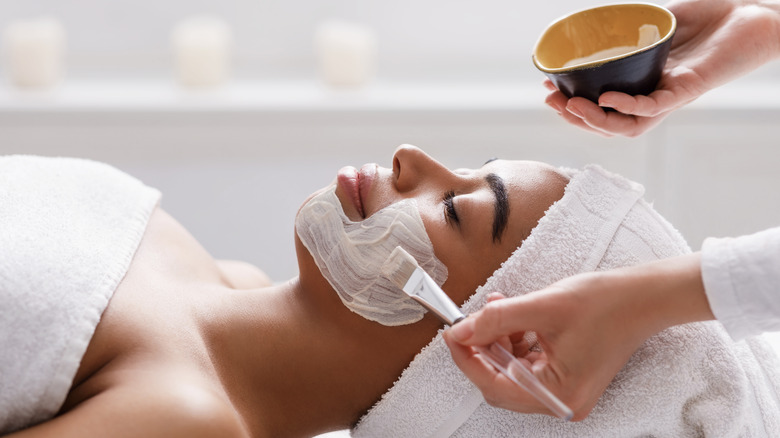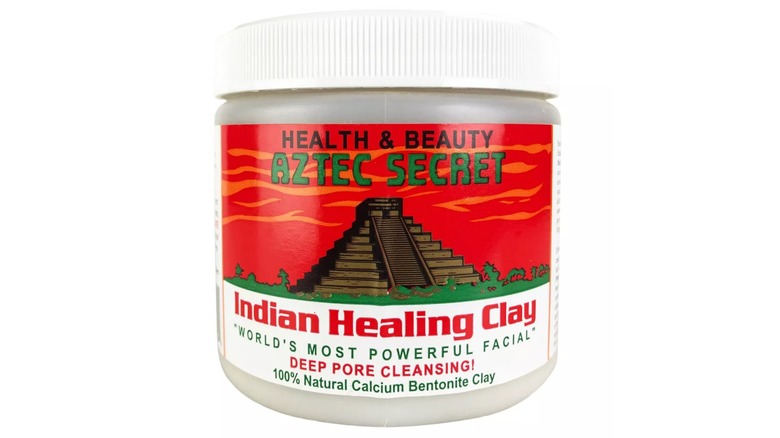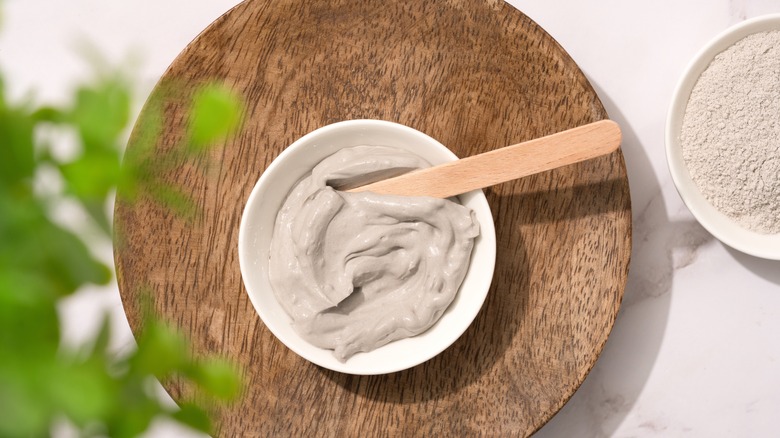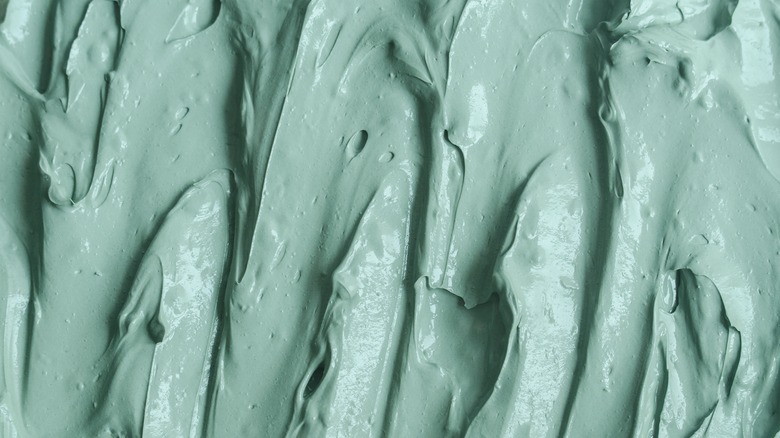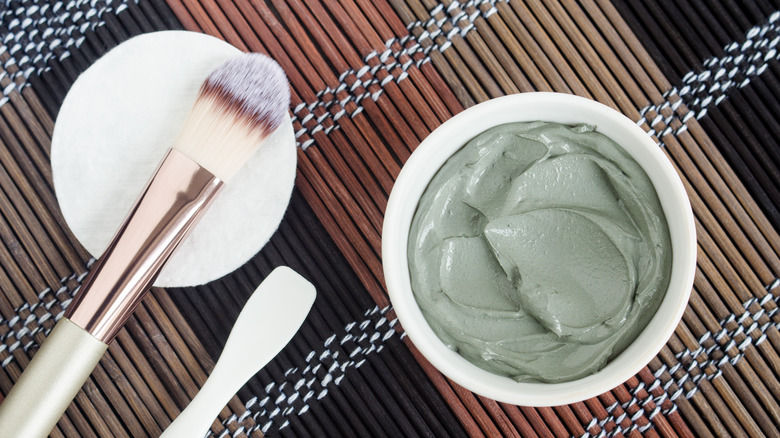The Skincare Benefits Of Bentonite Clay, Explained
We may receive a commission on purchases made from links.
Bentonite clay has played a part in wellness and healing rituals for people — both as a topical agent for skin and as an edible supplement. According to the National Library of Medicine, people believed that it had detoxification properties for the body. The name "bentonite" comes from Fort Benton, Wyoming, where it occurs in massive quantities. It's also sometimes called Montmorillonite clay, because of where it's found in Montmorillonite, France. Bentonite clay comes from volcanic ash, and is rich in minerals like iron, magnesium, and calcium, which is why it has been lauded as such a healing product.
Bentonite clay has remained a popular item to this day, and has a huge cult following as a face mask. It's no wonder, since the clay is so easy to use. One of the most popular brands of bentonite clay is the Indian Healing Clay Deep Pore Cleansing Face & Body Mask, which rings in at $12. Simply mix equal parts clay and equal parts apple cider vinegar. Apply to cleaned, makeup free skin. Leave it on for 10-20 minutes, then rinse off with water. The clay is a huge favorite for those with oily skin. It's also well loved by those who struggle with acne, since it's such a powerful product. It can't do everything, but bentonite clay is a great resource to have in your skincare routine.
Bentonite clay helps with oily skin
Bentonite clay works wonders on oily skin. Even those with combination skin can reap the benefits from this ancient clay. Bentonite clay is amazing for absorbing excess oil and it's a wonderful exfoliant. "Bentonite clay is so absorbent, it's like a sponge that binds to oil and dirt on the skin's surface," dermatologist Joshua Zeichner, MD, told Allure. It does this by controlling sebum production, leaving skin feeling fresher and more mattified. With this in mind, giving yourself a bentonite clay mask before a big event is a brilliant way to make sure that your makeup goes on flawlessly, especially if you're prone to getting shiny. So work this into your routine when prepping for a night out, because the clay is a mattifying wonder.
While oil on the skin is by no means a bad thing, excessive amounts of oil can lead to acne. As such, wicking away excess oil through bentonite clay masks is a helpful way to mitigate this problem. If you do have combination skin and don't want to overdo it with a full bentonite clay mask, you can absolutely use it as a spot treatment. Since it's anti-inflammatory, bentonite clay can help soothe the skin. It's best to use a bentonite clay mask about once a week as part of a comprehensive skincare routine.
What bentonite clay does for pores and cell turnover
Bentonite clay is a favorite of skincare enthusiasts because of its ability to absorb excess oils and settled makeup, thus minimizing the appearance of pores. Dermatologist Brooke Grant Jeffy, MD, explained to Byrdie that the clay can have a tightening effect on the skin, making pores appear smaller. It can also help on blackheads. It's important to note, though, that bentonite clay reduces the appearance of pores, so that skin looks both more matte and tighter. This is not to say that the clay has the capability of literally shrinking pores. However, wicking away makeup residue and drawing oil out of pores is great for them.
The clay also helps with cell turnover, which is crucial for healthy skin. "Cellular turnover is the biological process of shedding dead skin cells to replace existing skin cells with younger healthy cells," board-certified dermatologist Annie Gonzalez told Real Simple. "If cellular turnover does not occur, you can have buildup, and the skin will not be as tight or shiny." Bentonite clay can help with this. Cosmetic chemist Ginger King praised the calcium found in bentonite clay and told Allure, "Calcium bentonite clay is what you find in skin care because it's gentle and rich in the mineral calcium, which helps to improve cell turnover, boost moisture retention, and maintain an intact skin barrier." The exfoliating properties of bentonite clay boost skin's ability to shed dead skin.
How bentonite clay reacts to toxins
Bentonite clay has a negative charge, according to Science Direct, and therefore attracts positively charged particles. One of its more ancient uses was as a wine purifier, where it could pull unwanted particles from the wine, leaving the product clarified. The same principles apply to the skin. Since most toxins have a positive charge, bentonite clay's negative charge binds to these toxins and makes it easier to purge them from the skin when you wash it off of your face with water.
It's important to note, though, that bentonite clay isn't necessarily a detoxifying agent. Board-certified dermatologist Joshua Zeichner, MD, explained to Allure that people use the term "detoxifier" too liberally. When speaking of bentonite clay, Dr. Zeichner said, "While it has absorbent properties and can help to remove impurities, dirt, and particulate matter that accumulate on the skin during the day, bentonite clay does not filter toxins." Dr. Zeichner was clear about the ability of bentonite clay and added that our skin isn't really known for its ability to purge toxins. "The only detoxifying organs in the body are the liver and kidneys," the dermatologist added. That doesn't negate bentonite clay's strengths. It just means that we should come at the clay with more realistic expectations.
A word to the wise about bentonite clay
The best, and most popular way to use bentonite clay, is by mixing it with a liquifying agent. Apple cider vinegar is one of the most popular choices. "Bentonite clay has an alkaline pH," cosmetic chemist Ginger King told Allure. "And because of that, it's better to use apple cider vinegar to help neutralize the alkalinity so the mixture is milder. It also keeps the skin's pH at a normal 5.5." You can also use water to create a paste. Simply mix one part bentonite clay and one part water or apple cider vinegar. The mixture "...thickens and forms a gel matrix to trap oil and leftover makeup so that they can be washed off easily with water," King added.
It's also worth noting that bentonite clay comes in two different formulas. You only want calcium bentonite clay. Sodium bentonite clay serves industrial purposes, and it's not meant for the face and body. Be mindful about where you purchase the clay, too. Dermatologist Fatima Fahs, MD, explained to Byrdie why this is important. "There's no FDA regulation on how this clay is sourced and what other contaminants it may contain, such as heavy metals or pesticides," Dr. Fahs said. "This is why although there are many ways to purchase bentonite clay powder in bulk for very cheap, one should tread carefully." Sky Organics' Bentonite Clay is a great, affordable choice. SkinCeuticals Clarifying Clay Mask is a great splurge.
